

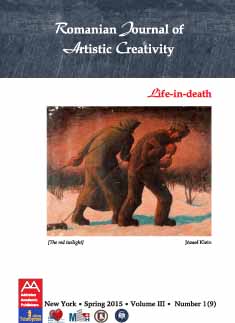
Creativity is domain-specific (hence “artistic creativity” in the journal title) and, at least for sound linguistic reasons, nation-specific (hence “Romanian” in the title). An age-old, philosopher- and theologician-friendly concept, covering fields like poetry, fiction, painting, sculpture, nonfiction, architecture (drawing and building), music (composing and performance), theatre (writing and performance), artistic creativity will come in a fresh perspective today only if it comes complete with psychology and psychiatry, also with such newcomers on the scene as genetics and biochemistry. All such dimensions considered, we will hopefully have a say in the matter, and our voice will be firm enough to ensure us a distinct position in international literature. The three-year planning of the quarterly issues (suicide-bound poets, norm-negotiating, art-loading, art-reloading, stress-related illness, suicide-resisting poets, buried-in-transaction, personality-trait disorders, alcohol consumtion and art production, personality) observes this multidisciplinary approach that, however, relies on personality-trait psychology to draw its basic philosophy on. The Editorial Team has been designed to cover the domains that are most likely to come up: psychiatry, psychology, anthropology, philosophy, (fine and liberal) arts, medicine and medicine-related fields, by and large; the Board of Directors has been largely made on the same principle. President of the Board of Directors: Doina Cosman (Iuliu Hatieganu University of Medicine) Editor-in-Chief: Mihai A. Stroe (University of Bucharest). Online submissions to: mihaistroe@yahoo.com Executive Editor: Bogdan C.S. Pirvu (Iuliu Hatieganu University of Medicine) bgdn_parvu@yahoo.com Public Relations: Muguras Maria Petrescu muguras_maria@yahoo.com
More...
Economics, Management, and Financial Markets provides a forum for theoretical, applied, policy and methodological research into social and economic issues, and publishes high quality original research on applied and theoretical issues related to the changing forms and boundaries of markets and planning, uneven development and world market instability; strategic management, organizational theory; securities trading and pricing. Strong emphasis is placed on critical perspectives, multidisciplinary approaches, the provision and use of empirical evidence, realistic analysis and accessibility to nonspecialists.
More...
Journal of Research in Gender Studies is a peer-reviewed bilingual interdisciplinary journal that aims to publish critical and theoretical constructive contributions across the large spectrum of humanities – literature, law, history, philosophy, religion, and visual and performing arts (including music and theatre), anthropology, area studies, communication studies, cultural studies, and linguistics, social sciences, behavioral sciences, medicine and public health, science and technology, democracy studies, women’s studies, men and masculinity studies, queer studies.
More...
Geopolitics, History, and International Relations seeks to explore the theoretical implications of contemporary geopolitics with particular reference to territorial problems and issues of state sovereignty, and publishes papers on contemporary world politics and the global political economy from a variety of methodologies and approaches. Interdisciplinary and wide-ranging in scope, Geopolitics, History, and International Relations also provides a forum for discussion on the latest developments in the theory of international relations and aims to promote an understanding of the breadth, depth and policy relevance of international history. Its purpose is to stimulate and disseminate theory-aware research and scholarship in international relations throughout the international academic community. Geopolitics, History, and International Relations offers important original contributions by outstanding scholars and has the potential to become one of the leading journals in the field, embracing all aspects of the history of relations between states and societies. Journal ranking: A on a seven-point scale (A+, A, B+, B, C+, C, D). Geopolitics, History, and International Relations is published twice a year by Addleton Academic Publishers, 30-18 50th Street, Woodside, New York, 11377. All papers in this journal have undergone editorial screening and anonymous double-blind peer-review
More...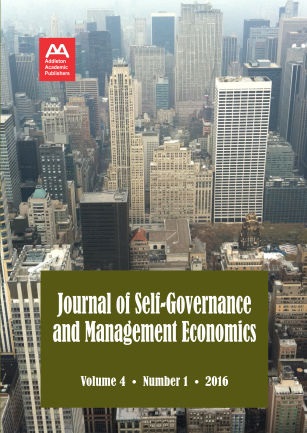


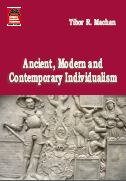
Keywords: politics; economy; individuality; history; ethics; political dialogue; individual rights; political economy;
An individualist usually believes that human beings, contrary to what socialists like Karl Marx or Auguste Comte thought, are first and foremost unique, irreplaceable members of the human species, capable of independent thought and action once they reach maturity, and free to choose their conduct based on their conscious thinking. As such, they require the kind of community that makes room for their independence, a community that protects individual rights to life, liberty and the pursuit of one’s chosen goals in life. Although members of the human species and thus possessing a few common attributes, human individuals are a varied lot and flourish best in communities that makes varied pursuits possible, such as the free market political economic order. From time immemorial the individuality of human beings has been evident (mostly so in creative realms such as art, religion and technology) although often suppressed by rulers who wanted a one size fits all type of society to serve their own objectives. So in various historical times it has been a struggle to forge political-legal systems that do full justice to our human individuality.
More...
Keywords: Tibor Machan; radical libertarian; interview; political economy; classical liberal tradition; laissez faire tradition; bona fide free society; human liberty; Individualism;
Machan, a radical libertarian, addresses a wide array of political economic issues, in a variety of interviews he has given over five decades. This book is rich with insights from the classical liberal, laissez faire tradition, the only one that consistently supports the idea of a bona fide free society. Machan discusses innumerable topics with a relentless concern for securing individual human liberty in all of its dimensions.
More...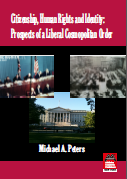
Keywords: citizenship; human rights; identity; culture; freedom; liberal values; cosmopolitan order; ethics; education;
This book focuses on the notion of citizenship in relation to the notions of human rights, identity and culture. It poses the question of the prospects of a liberal cosmopolitan order dealing with a number of interrelated themes: ethics, emancipation and what Derrida calls the “new humanities;” identity, war and crimes against humanity; citizenship, and education rights within a knowledge economy; colonization, development and peace; changing notions of democracy within an information society; and culture, difference and otherness. These are the themes that make problematic aspects of the liberal cosmopolitan order. One of the main tropes connecting these themes is how the primary liberal values of freedom, emancipation and equality work out in a globalized world. The interrelationship of these values are problematized in different settings as they relate to issues of global world order with a focus on the adaptability of the liberal framework of values and law in creating a genuine cosmopolitan order.
More...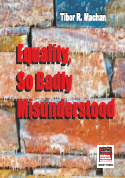
Keywords: equality; wealth; health; education; burdens; human rights; fairness; political theory; Egalitarianism;
The effort to make people equal in various important respects, e.g., wealth, health, education, burdens and advantages of all kinds, is the focus of criticism in this short work. I hold and argue that this effort is misguided, often very harmful and also frequently insidious, a guise for mischief by those who embark on the pursuit. The only valid form of equality pertains to people’s basic human individual rights—all who aren’t crucially incapacitated have these, so they are often called the equal rights of all persons. As regards politics and law this implies that no adult may be treated with special favor or disfavor by the legal authorities, whether in court or via public policy. Since the job of politics is to protect the equal rights of human individuals, everyone is equal under the law. But that’s the end of it, politically. Fairness is not a political good but one that has a role in various social contexts, such as family, teams, clubs, sport, beauty contests, and so forth. And fairness comes into play, other than in these areas, only when people voluntarily join some organization where they expect to be treated as all others who belong. Why so much fuss about equality and fairness? Some of the reasons have to do with the history of politics wherein kings and other rulers were expected to treat their subjects similarly, without favor to some of them and disfavor to others. And there is the tendency to extrapolate from family life, where parents are supposed to be fair to their children. Also, when teachers grade members of their classes, there is an implicit or explicit promise to do so unbiased, without special treatment of any (other than where justified, as when a student suffers from some impediment). But none of these imply or support the policies of egalitarianism. These and related topics comprise the content of this short volume and all egalitarians are invited to reflect on what is discussed here. In the tradition of classical political philosophy, this is not a technical, jargon-laden work, so any citizens can read it and gain food for thought.
More...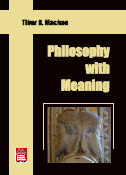
Keywords: philosophy; ethics; human living; politics; metaphysics; epistemology; political philosophy; aestethic;
In this work I wish to present and defend ‘my’ philosophy or rather the philosophy that I consider sound. In addition, I will also answer a host of questions in the discipline put to me by people over the course of about 8 years as an ‘expert’ on Allexperts.com. The ethics I will be defending is concerned with guiding human living to be successful, to excel as human living in the particular instance of the individual agent. Some minimal general principles will be identified while the highly plural element of right conduct will also be made evident. After I consider ethics, I will turn to politics and explore what kind of communities are best suited for human beings. Such communities may well be highly diverse but arguably, since they are to be places for human beings to live and to flourish, they will have to have certain attributes or constitutive features (constitutions) that are best for people.
More...
Keywords: philosophy; disciplines; subjectivity; objectivity; epistemology; knowledge; economy; ethics; politics; human communities; aesthetics;
Not only is philosophy a discipline that’s rarely discussed outside of the academy; sometimes it’s regarded to be a very curious, obscure subject matter, one that people don’t know where to place. Yet no one can avoid philosophy entirely. Even to try amounts to being philosophical. When it comes to philosophy’s various branches, most would list only ethics as a familiar one since the question of how people should conduct themselves is difficult to classify as a branch of any other discipline, such as sociology, economics or chemistry. Ethics is pretty widely acknowledged to be part of philosophy as well as an everyday concern while it’s also quite problematic. Within ethics it is pretty usual to find that people wonder whether one can discover anything that is objectively true, as most of us would agree it’s possible in fields such as physics or chemistry. The natural or hard sciences, in other words, would all be about what is true, what is not, how we tell the difference, and so forth. Other disciplines are viewed to be less amenable to that possibility. In the field of ethics a lot of people believe truth is difficult if not entirely impossible to find. Is it true that one should not lie, deceive, steal, cheat, mislead, etc.? Or is it something that’s up to the acting agent or one's cultural group? In other words, are ethical claims subjective or objective? Yet that’s not the only branch of human inquiry wherein this issue arises. Are religious claims subjective or objective? Are claims in such fields as sociology, anthropology, or economics open to objective investigation or are these mostly subjective, a matter of what the person who is involved in considering them decides?We often hear that beliefs or claims in these areas are advanced from someone’s point of view, which is to say they are subjective. In this short book that is the issue that’s the central focus: are judgments people make in various fields of concern subjective or objective, can they be the latter or only the former? If the former, will we then ever get to know the world as it really is? Or only as we like it to be or it appears to be? If objectivity is available, is it restricted only to the natural sciences? Or could we be objective about politics, art and psychology? That is basically what this book is about, whether people can obtain objective knowledge.
More...
Keywords: TechnoFeminist Science Fiction; cyberfeminism; cyborg feminism; sociotechnical network; politics; technofeminism; Donna Haraway; science fiction;
This study has coined the term TechnoFeminist Science Fiction by grounding it on the insights of Judy Wajcman’s TechnoFeminist approach that combines cyberfeminism and cyborg feminism following the philosophies of Sadie Plant and Donna Haraway. The core study of TechnoFeminism gives voice to the mutual relationship between women and technology that is a constructivist and a sociotechnical network by rejecting technological determinism. Likewise, TechnoFeminist Science Fiction, a new trend in women or feminist science fiction, provides both technoscientific politics and TechnoFeminist politics in desire for women or feminist science fiction writers to be more active in creating female cyber and cyborg images in their technoscience fictions. Thus, it aims to create new women perspectives and point of views by erasing the gender duality problem with characterization of emancipatory cyberself and cyborg embodiment through breaking down the boundaries between human and machine, animal/organism and machine, and physical and non-physical organisms. The aim of this study is to demonstrate how British novelists, Justina Robson and Sue Thomas, have opened a different technodigital space for equal and mutual relationship between gender and technology by weaving the issues of TechnoFeminism and the concepts of technoscience, AIs, genetic technologies, the internet, regenerative technologies, communication technologies, nanotechnology, biotechnology, molecular biology and they have also developed an image of the cyborg consistent with any of Haraway’s cyborg metaphors and cyberspace consistent with Plant’s cyberfeminism with wired, wet, fluid, flexible, adaptable, mutable, multiple, ever-flowing, unstable, self-controlled, virtual cyberselves.
More...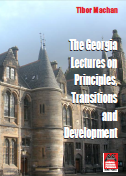
Keywords: Georgia; Tbilisi; lectures; principles; transitions; development;classical liberal social thought; political thought; classical liberalism; natural rights; freedom; ethics;
These lectures were given in Tbilisi, Georgia, for a group of students and faculty interested in classical liberal social and political thought. Given their accessibility, they may be of use to others who want to have a clear view of what best supports that position. I advance a natural rights defense of classical liberalism, drawing on the work of many scholars who have discussed the ideas involved. (Several of my other books take up the more specific topics that need to be addressed in laying out the case for the society of free men and women, a society of free minds and free markets.)
More...
Keywords: free market; normative defense; Capitalism; financial fiasco; economy; market system; market fundamentalism; morality; classical Individualism; natural rights;
Machan’s book advances an indispensable normative case for the free market system of economy. He addresses the different approaches taken to showing the superiority of the system to others and also discusses the charge that the recent financial fiasco was caused by “market fundamentalism,” as the likes of Paul Krugman keep claiming. This is a vital entry into the on-going debate about whether the economic system based on the principles of freedom of economic conduct, free exchange, private property rights, etc., is better than one regimented from the top, either by some czar or a democratic assembly. Anyone who is concerned with both the productivity and decency of an economic system needs to address Machan’s arguments.
More...
Keywords: Michael A. Peters; scientific life; education; philosophy; economy; political economy; knowledge; education systems; education policy; democracy; market; liberalism; Wittgenstein; Foucault; knowledge; marxism; universalism; cosmopolitanism;
More...
Keywords: Sylvia Plath; mental disorder; suicide; literary phenomenology; psychotherapy; artistic personality;
The biopsycholiterary joint partnership between a professor of literature (Elena Ciobanu) and a clinical psychiatrist (Bogdan C.S. Pîrvu) was meant to diagnose the condition of a poet (Sylvia Plath) who, with a comorbid borderline personality disorder, had a bipolar II disorder that drove her to commit suicide. In equally specific, because technical, terms, the biopsychosocial approach extrapolated from narrative medicine was made to come complete mostly with strategies borrowed from literary phenomenology and designed to explore the Artistic Personality on its own premises, and occasionally with psychotherapeutic tools that are conveniently adept at dealing with mental disorders and family relationships. In mundane terms, this book is not a biography proper; it is an open-minded account of the intricate entanglements of poetry, personality and mood, perceptively and cautiously intent on behavioural, affective and cognitive changes, on the impact any such fluctuations might have had on the art of Sylvia Plath.
More...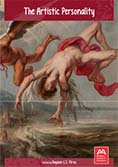
Keywords: artistic personality; nay-powered personality; lead-flowered personality; psychopathology;
With constant references to Cloninger, Cosman and mainly Gray for the description of a model (AS) with anxiety-as-introverted-neuroticism and sociability-asextraverted- neuroticism; with recurrent recourse to Rusu, Pamfil, Cosman and mainly Kant for the description of creativity-as-product; with many a reverence to Andreasen, Jamison and mainly Aristotle for the description of creativity-asprocess – we will stipulate that the connection between psychopathology (PP) and big-C creativity (CC), a “melting pot” from which we have extracted personality traits (PT) and then the genetic code (DNA), intelligence (IQ) and a certain zeitgeist (ZG), is quite organic, namely that big-C creativity (CC) feeds on subclinical hypomania (SCHM), formative originality (FO) and subliminal psychopathology (SLPP). In a rather more condensed formulation, CC (AS + DNA + IQ + ZG) is informed by SCHM and encoded by FO and SLPP. By entabulation: CC (AS + DNA + IQ + ZG) → SCHM → FO + SLPP. This book, hopefully part of a long-standing Artistic Personality series, is an overt illustration of the aforementioned thesis, with special reference to Ion Creangă and George Bacovia, two foremost Romanian representatives of prose (an 80% psychopathology in a sample of 110 writers) and poetry (93.75% psychopathology in a sample of 80 poets).
More...